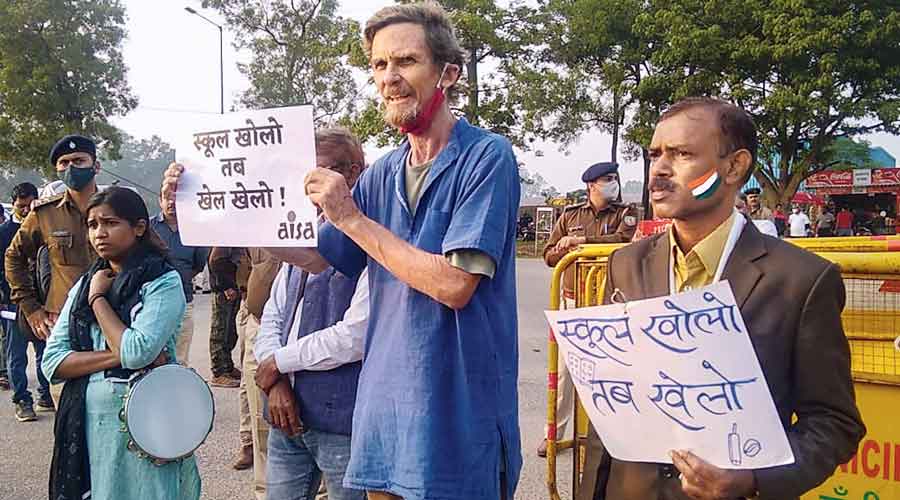Frustrating budget allocation, delayed payment of wages and contractors-middlemen-official nexus, among other factors, are defeating the spirit of the rural job scheme under the Mahatma Gandhi National Rural Employment Guarantee Act 2005 in Jharkhand.
A report card released on Wednesday by NREGA Watch, an NGO monitoring the scheme in the state, on the occasion of the 16th anniversary of commencement of the Act in 2006 that guaranteed 100 days work to needy rural families said this.
While 48.87 lakh households were registered under the scheme before Covid induced lockdown was imposed in March 2020, their number went up to 62.80 lakh during the second wave of the pandemic as 13.93 lakh migrant labourers returned to their native state and sought jobs, the report card informed, adding 69.19 lakh families with 1.13 crore total beneficiaries were registered at present.
The budget allocation in 2019-20 was Rs 1,311 crore but the state government spent Rs 1,700 crore. In the Covid year 2020-21, the allocation rose to Rs 3,489 crore of which Rs 3,150 crore was spent and Rs 2,278 crore was released so far in the current fiscal while Rs 2,664 crore was already spent, the report card further informed, highlighting inadequate budget provision.
“We apprehend there will be no upward revision of wages now and less number of mandays will be created due to this,” NREGA Watch convener James Herenj said when pointed out that the Union budget presented on Tuesday slashed MGNREGA allocation for 2022-23 by 25.52 per cent to Rs 73,000 crore from the revised estimate of Rs 98,000 crore for the current fiscal (2021-22).
While inadequate budget allocation created less number of mandays, delayed payment of wages put the poor workers into further trouble, the report card pointed out.
Though the government website often shows that wages have been fully paid within stipulated 25 days, wages totalling to Rs 2,662 crore remained pending for first two months at the beginning of the current fiscal (2021-22), Rs 1,766 crore was pending during October-November (2021) and Rs 434.14 crore is still pending, it added.
“Surprisingly, tribal participation in the rural job scheme gradually decreased over the years,” Herenj pointed out, adding it came down from 38.95 per cent in 2015-16 to 23.69 per cent in 2021-22 so far, though 57 days are still left for the current fiscal to end.
“Legal provisions are also often violated,” Harenj added, saying social audit of the scheme remained largely pending since February 2020 as did appointment of a Lokpal for the past 5 years and also selection of appropriate rural schemes by local panchayat bodies.
The only social audit done during the period pointed out how the job meant to be executed by MGNREGA workers manually were done by machines and master roll prepared with names of villagers chosen by contractor and middlemen and uploaded on data base in connivance with a section of government employees, the report card further pointed out.
“The central government’s serial failure to provide adequate funds for MGNREGA has created a vicious cycle of annual fund crunch and wage arrears,” development economist John Dreze who was the architect of the draft rural job act before it was enacted told The Telegraph.
“The long arrears in wage payments associated with the annual crisis defeat the entire purpose of the programme,” he added.











